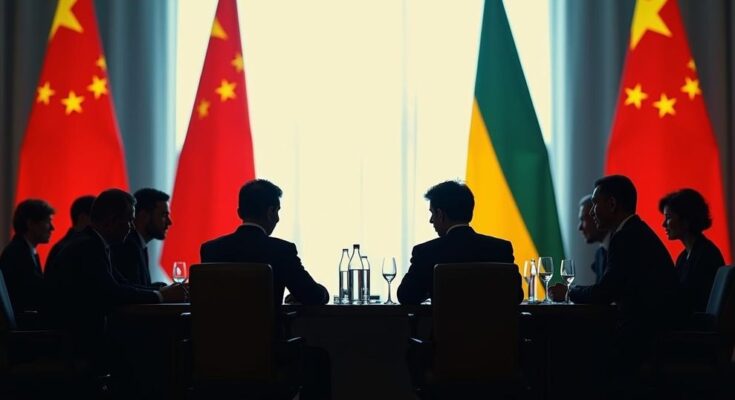China and Brazil met at the UN General Assembly in a bid to mediate peace between Russia and Ukraine, emphasizing non-sanctioning approaches and inclusive dialogue. The discussion excluded the US and EU, raising questions about the proposal’s acceptance. Ukrainian President Zelensky criticized the initiative, insisting that true peace requires compelling Russia, rather than dialogue alone.
On the occasion of the United Nations General Assembly, representatives from China and Brazil convened to further their longstanding efforts to mediate a peaceful resolution to the ongoing conflict between Russia and Ukraine. This meeting, characterized by comprehensive objectives yet a lack of concrete proposals, reflects the two nations’ desire to play a significant role in fostering dialogue between the conflicting parties. Chinese Foreign Minister Wang Yi articulated his hope for the establishment of an international peace conference, advocating for a fair examination of all suggestions from the global community. He emphasized the importance of refraining from utilizing the conflict as a pretext for imposing sanctions, seemingly aimed at the United States. Wang stated, “We want to be partners to Russia and Ukraine as they work towards peace. We must avoid a resurgence of a Cold-War mentality.” The discussions included participation from several other countries, namely Algeria, Bolivia, Colombia, Egypt, Indonesia, Kazakhstan, Kenya, Mexico, South Africa, Turkey, and Zambia, while the United States and European Union notably abstained from involvement in these deliberations. Observers from France, Hungary, and Switzerland were present at the meeting. In contrast, Ukrainian President Volodymyr Zelensky expressed skepticism about the joint proposal presented by Brazil and China, asserting that diplomatic engagement would not compel Russia to achieve peace, stating, “Russia can only be forced into peace, and that is exactly what’s needed.”
The ongoing conflict in Ukraine, which escalated significantly in 2022 with Russia’s invasion, has drawn international scrutiny and prompted various nations to seek resolutions. China and Brazil have positioned themselves as potential mediators in this dispute, aiming to foster peace amid increasing tensions and a lack of consensus on how to move forward. The recent meetings on the sidelines of the UN General Assembly signify an effort to unify voices from different nations, though critical perspectives, such as those from Ukraine, highlight the complexities involved in resolving such a significant geopolitical conflict. Moreover, the absence of major Western powers from these discussions raises questions about the viability and acceptance of the proposed peace initiatives.
The meeting between China and Brazil aimed at mediating peace talks for Ukraine highlights the growing role of nations outside the traditional Western bloc in addressing global conflicts. Despite aspirations for a comprehensive peace conference, the skepticism voiced by Ukrainian leadership underlines the challenges faced in reaching a diplomatic resolution, complicating efforts by emerging world powers to facilitate dialogue. The calls for a fair discussion reflect a desire for inclusivity in the peace process, yet the lack of direct involvement from the United States and the European Union raises concerns about the effectiveness of such initiatives.
Original Source: www.scmp.com




